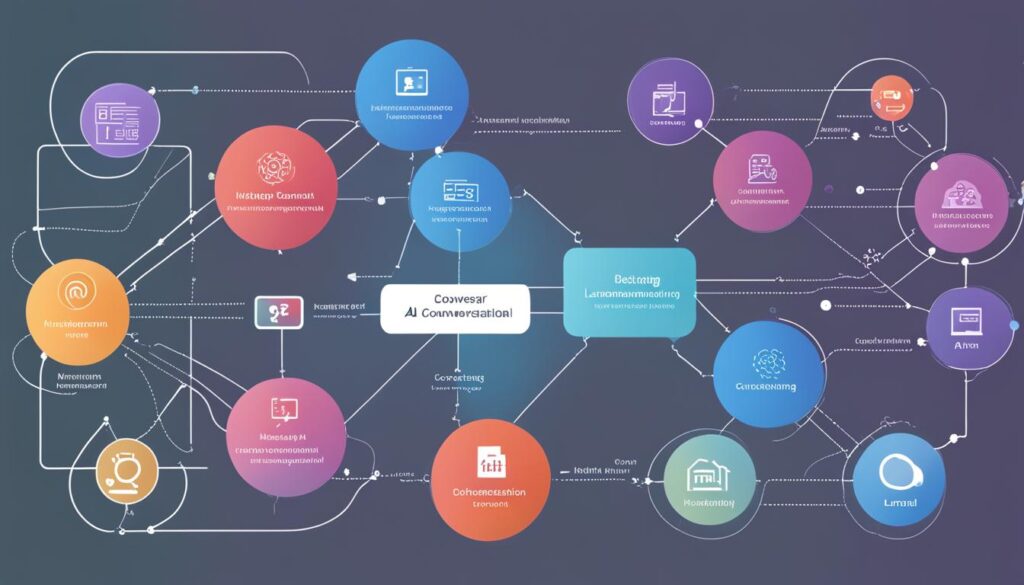Customer sentiment analysis plays a crucial role in understanding how customers truly feel about conversational AI. As businesses continue to embrace this technology, it is important to gauge the level of customer satisfaction and address any concerns or improvements needed.
Conversational AI has gained popularity among consumers, with many recognizing its ability to improve customer service efficiency. In fact, a recent survey revealed that 74 percent of customers believe conversational AI enhances their overall experience. This highlights the positive impact this technology can have on businesses and their customers.
By analyzing customer sentiment, organizations can gain valuable insights into the effectiveness of their conversational AI solutions. It allows businesses to assess whether customers find the interactions helpful, enjoyable, and personalized. Understanding customer sentiment not only helps enhance customer experiences but also drives business performance and customer loyalty.
This article will delve into the world of conversational AI, exploring what it is, how it works, and the benefits it offers. We will also examine different examples and use cases to illustrate its practical applications. Furthermore, we will provide insights on how businesses can successfully implement conversational AI strategies to deliver seamless and personalized customer interactions.
Stay tuned for the upcoming sections to gain a deeper understanding of how customers truly feel about conversational AI and how it can revolutionize customer experiences.
What is Conversational AI?
Conversational AI is a revolutionary application of artificial intelligence (AI) that enables machines to engage in human-like conversations. By utilizing advanced technologies such as natural language processing (NLP), AI chatbots, and virtual assistants, conversational AI systems can understand and respond to speech and text inputs with human-like accuracy and intelligence.
With NLP at its core, conversational AI allows computers to comprehend the nuances of human language, including context, intent, and sentiment. This enables AI chatbots and virtual assistants to provide personalized and contextually relevant responses, enhancing the overall customer experience.
“Conversational AI brings the power of AI-driven communication technology to customer interactions, enabling businesses to provide seamless and engaging experiences.”
AI chatbots are designed to mimic human conversation, employing algorithms and machine learning techniques to understand and generate human-like responses. These chatbots can be deployed across various platforms and channels, including websites, mobile apps, messaging services, and voice assistants.
Virtual assistants, on the other hand, are more sophisticated conversational AI systems capable of executing complex tasks and providing comprehensive support. They can understand user queries, perform actions, and retrieve information from databases or external sources, making them valuable assets in customer service and support scenarios.
Benefits of Conversational AI:
- Enhances customer engagement and satisfaction
- Improves response time and efficiency
- Provides personalized interactions
- Enables 24/7 availability and support
- Reduces workload for human agents
Examples of Conversational AI:
Conversational AI has already transformed various industries, including customer support, e-commerce, healthcare, and banking. Here are a few notable examples:
- Accor Plus: The hospitality company utilizes a chatbot to assist customers with booking inquiries, personalized recommendations, and general information about their loyalty program.
- Fútbol Emotion: The online soccer retailer employs a virtual assistant that helps customers find products, provides size information, and gives status updates on orders.
Key Features of Conversational AI
| Feature | Description |
|---|---|
| Natural Language Processing (NLP) | Enables machines to understand and generate natural language |
| AI Chatbots | Simulate human-like conversations and responses |
| Virtual Assistants | Perform complex tasks and provide comprehensive support |
| Personalization | Deliver tailored interactions based on user preferences and data |
| Availability | Ensure 24/7 support and accessibility for customers |

How Does Conversational AI Work?
Conversational AI, powered by natural language processing and machine learning, enables sophisticated interactions by interpreting human conversations and generating appropriate responses. This transformative technology continually learns from customer interactions, improving its capabilities over time. By incorporating new information into its knowledge base, conversational AI software becomes increasingly advanced.
Through natural language processing, conversational AI understands and analyzes speech and text inputs, allowing for human-like conversations. Machine learning algorithms enable the AI system to adapt and improve its understanding of language patterns, meaning, and context. This enables it to provide more accurate and contextually relevant responses to customer queries.
To enhance transparency with customers, it’s important to clearly indicate when they are communicating with an AI-powered system rather than a human agent. This ensures customers are aware of the capabilities and limitations of the technology. Additionally, providing a seamless transition to human agents when desired helps maintain a positive and personalized customer experience.
Take a look at the diagram below to visualize the working of Conversational AI:

| Key Components of Conversational AI | Explanation |
|---|---|
| Natural Language Processing (NLP) | NLP allows the system to understand and interpret human conversations, including speech and text inputs. It enables the AI to process and analyze the meaning, sentiment, and intent behind user queries. |
| Machine Learning | Machine learning algorithms enable the AI system to learn and adapt from data, improving its ability to understand and respond to customer queries. It continually refines its knowledge base to provide accurate and relevant information. |
| Knowledge Base | The knowledge base is a repository of information, including FAQs, product details, and support documentation. The AI system utilizes this knowledge to generate appropriate responses based on the customer’s query. |
Benefits of Conversational AI
Conversational AI offers numerous benefits to businesses and customers, revolutionizing the way customer interactions are handled. By leveraging advanced technologies, conversational AI enhances customer satisfaction, provides personalized responses, and delivers proactive support. These advantages have a significant impact on customer engagement, sales conversions, and overall business success.
Enhanced Customer Satisfaction and Engagement
One of the primary benefits of conversational AI is its ability to provide fast and interactive responses, ensuring that customers receive immediate assistance whenever they need it. With conversational AI, businesses can offer support 24/7, eliminating the frustration of long wait times and unavailable agents. This availability and responsiveness contribute to heightened customer satisfaction and improved engagement.
Personalized Responses and Proactive Support
Conversational AI leverages customer data to deliver personalized responses and recommendations. By analyzing customer preferences, behavior, and purchase history, AI chatbots can offer tailored solutions and suggestions. This personalized approach enhances the customer experience, making interactions more relevant and effective. Additionally, conversational AI empowers businesses to provide proactive support, anticipating customer needs and addressing issues before they even arise. Proactive support ensures that customers feel valued, leading to increased loyalty and repeat business.
Understanding Customer Sentiment and Tailoring Interactions
AI chatbots possess the ability to analyze customer sentiment, allowing agents to understand the underlying emotions and tailor their interactions accordingly. By accurately interpreting customer tone, sentiment, and intent, conversational AI can provide empathetic and appropriate responses, creating a more human-like experience. This understanding of customer sentiment helps businesses build stronger relationships and resolve issues effectively, improving overall customer satisfaction.
To summarize, conversational AI offers significant advantages, including enhanced customer satisfaction, personalized responses, proactive support, and the ability to understand and cater to customer sentiment. By implementing conversational AI technology effectively, businesses can drive customer engagement, loyalty, and ultimately, business growth.

Types of Conversational AI Technology
When it comes to conversational AI technology, chatbots play a crucial role in delivering seamless and efficient customer experiences. As AI-driven communication tools, chatbots are designed to understand and respond to both speech and text inputs, enabling businesses to engage with customers effectively.
One of the key advantages of chatbots is their ability to work seamlessly across different channels, such as websites, messaging apps, and voice assistants. This versatility allows businesses to meet customers where they are and provide consistent support, regardless of the platform.
Another important feature of chatbots is their capability to facilitate smooth bot-to-agent handoffs. In complex scenarios or when human intervention is required, chatbots can seamlessly transfer the conversation to a human agent without causing any disruption.
By eliminating siloed chats and creating a continuous conversation, businesses can deliver a seamless customer experience. Customers no longer need to repeat their queries or provide context multiple times when switching from one channel to another, enhancing their overall satisfaction.
To fully leverage the benefits of conversational AI technology, it is crucial for businesses to consider the conversational capabilities of chatbots. These include:
- Natural Language Processing (NLP): Chatbots equipped with NLP capabilities can understand and interpret user inputs more accurately, leading to more effective and human-like conversations.
- Contextual Understanding: Advanced chatbots can maintain context throughout a conversation, enabling them to provide relevant and personalized responses based on previous interactions.
- Multi-turn Dialogue: Chatbots with multi-turn dialogue capabilities can handle complex conversations by remembering and referring back to previous interactions during the current conversation.
Implementing chatbots with these conversational capabilities will enable businesses to deliver exceptional customer experiences and streamline support processes.
Comparing Conversational AI Technologies
| Chatbot Technology | Natural Language Processing (NLP) | Contextual Understanding | Multi-turn Dialogue |
|---|---|---|---|
| Basic Chatbot | No | No | No |
| Advanced Chatbot | Yes | Yes | Yes |
The table above compares basic and advanced chatbot technologies based on their capabilities in natural language processing, contextual understanding, and multi-turn dialogue. While basic chatbots provide limited conversational abilities, advanced chatbots offer more sophisticated features to create more engaging and personalized interactions with customers.
By selecting the right conversational AI technology and implementing chatbots with the necessary capabilities, businesses can enhance their customer experiences and maximize the benefits of conversational AI.
Conversational AI Examples and Use Cases
Conversational AI technology is revolutionizing customer support by providing efficient solutions for various use cases. Whether it’s handling information requests, answering frequently asked questions (FAQs), or facilitating basic transactions, conversational AI has proven to be a valuable tool in enhancing customer experiences.
Automated solutions powered by conversational AI are especially favored by customers when it comes to common tasks such as checking order status and accessing FAQs. By leveraging the capabilities of conversational AI in customer support, businesses can greatly improve response time, resolution time, and overall customer satisfaction.
Let’s take a look at a few successful examples where companies have implemented conversational AI to drive customer satisfaction and support efficiency:
- Accor Plus: Accor Plus, a leading hospitality company, utilizes conversational AI to enhance customer support for its loyalty program members. Through AI-powered chatbots, Accor Plus is able to handle member inquiries, provide personalized recommendations, and assist with membership-related transactions. This automation has resulted in significant improvements in customer satisfaction and support efficiency.
- Fútbol Emotion: Fútbol Emotion, a popular sports retailer, has integrated conversational AI into its customer support system to efficiently handle information requests and address FAQs. By implementing AI chatbots, Fútbol Emotion ensures that customers receive prompt and accurate responses, leading to improved customer satisfaction and a streamlined support process.
These examples highlight the effectiveness of conversational AI in customer support and its ability to provide personalized and efficient interactions. By deploying conversational AI technology, businesses can optimize their customer support operations, resulting in enhanced customer experiences and increased brand loyalty.
“Conversational AI allows businesses to deliver personalized and efficient support, ultimately improving customer satisfaction and loyalty.”
Implementing conversational AI is a strategic approach that benefits both customers and businesses. By leveraging this technology, companies can provide seamless and responsive customer support, leading to stronger customer relationships and increased operational efficiency.

How to Implement Conversational AI
Implementing conversational AI requires a well-planned strategy that aligns with your overall customer experience (CX) strategy. By seamlessly integrating conversational AI across multiple channels and providing personalized customer interactions, you can enhance customer engagement and satisfaction.
Collaboration for Success
To ensure the successful implementation of conversational AI, collaboration among designers, engineers, and business stakeholders is crucial. By working together, you can develop conversational AI solutions that meet consumer expectations and align with your business goals.
Ongoing Monitoring and Optimization
Implementing conversational AI is an iterative process that requires ongoing monitoring and optimization. By analyzing customer interactions and feedback, you can identify areas for improvement and refine your conversational AI strategy.
“Implementing conversational AI is not a one-time project, but an ongoing journey of enhancing customer experiences and driving business growth.”
The Power of Personalization
Personalization is key to delivering exceptional customer experiences. By leveraging customer data and preferences, you can tailor conversational AI interactions to each individual, creating a more personalized and engaging experience.
| Benefits of Implementing Conversational AI: | How to Achieve Them: |
|---|---|
| Improved customer satisfaction | Integrate conversational AI seamlessly across channels to provide consistent and efficient support. |
| Increased customer engagement | Personalize customer interactions and proactively anticipate their needs. |
| Efficient support processes | Optimize conversational AI solutions based on customer feedback and performance analytics. |
By following these implementation strategies, you can unlock the full potential of conversational AI and create exceptional customer experiences.
Conclusion
Conversational AI has revolutionized customer support, enhancing customer experiences and boosting business performance. With the increasing popularity of AI-driven communication technology, such as chatbots and virtual assistants, conversational AI has witnessed widespread adoption. By implementing conversational AI effectively, businesses can not only optimize customer satisfaction but also provide personalized interactions and streamline support processes.
Continual improvement is crucial for the success of conversational AI initiatives. By aligning with customer expectations and staying up to date with evolving technology, businesses can stay ahead of the game. Conversational AI enables companies to offer efficient and proactive support, ensuring that customers have their queries addressed promptly and accurately.
Moreover, conversational AI paves the way for a seamless customer experience by seamlessly integrating with various communication channels. This ensures that customers can interact effortlessly across different platforms, facilitating a smooth transition from bot to human agent if necessary. By leveraging conversational AI and its AI-driven communication technology, businesses can create personalized and engaging experiences for their customers, building strong relationships and driving loyalty.
